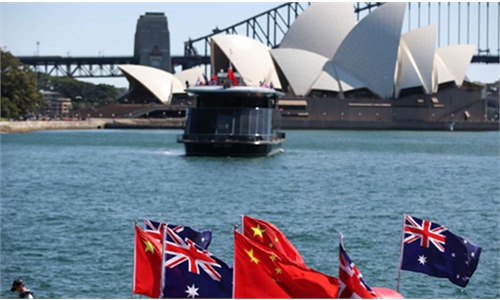COMMENTS / EXPERT ASSESSMENT
Turning to Japan and India futile for Australian tourism in crisis

Illutration: Xia Qing/GT
Amid Canberra's reckless diplomatic strategy and deteriorating ties with its largest trading partner, its tourism has emerged as a new sector unable to avoid the fallout with declining tourists from China even after the pandemic ends. Industrial practitioners are reportedly planning to turn to Japan and India for make up for these new dynamics, which would only end in futility as has been seen before.
Chinese travelers, the largest tourism source for Australia, are unlikely to return to the country in the same numbers as before the COVID-19 pandemic unless bilateral relation can be improved, news outlet ABC reported, citing a tourism expert's warning.
It is within expectation that increasing Australian industries would be impacted by the cooling down China-Australia relation, from agriculture to education and now tourism; and it is not the first industry intending to look to other markets amid the crisis. However, the unique value of Chinese tourists is clear to Australia as well as other markets; and repeating the notion of finding new markets seems only be a way of self-justification and self-consolation.
China, with the world's largest population of middle-class consumers, exports the largest number of tourists who also possesses strong consumption capability comparing to travelers from other countries.
Solely in Australia's state of Victoria, 675,600 Chinese visitors spent AU$3.4 billion ($2.54 billion) on trips to the state in the year ending December 2019, accounting to 38.3 percent of all international overnight visitor spend in Victoria, more than the next ten markets combined.
In comparison, Japan has witnessed a declining population with a relatively different traveling consumption pattern with Chinese tourists. The growth potential of Japanese travelers is insufficient and it's hard to boost consumption even within Japan, not to mention turning to Japanese travelers to boost consumption in other markets.
And India cannot offer a large number of cross-border travelers to the world even with a similar population size as China. According to the World Bank, China's gross national income per capita in 2020 recorded $10,610 while India was at $1,900. Being hardly hit by the coronavirus, poverty in India has doubled during the first wave of infection, according to Indian media reports.
Currently bogged down in the pandemic, Australia's declining tourist numbers from China may still be, to some degree, ascribed to some cross-border travel restrictions, but the pain of losing its largest tourism source will become more distinct when cross-border traveling resumes.
Dimming prospects can be expected in many Australian industries if Canberra cannot genuinely redress its failed diplomatic strategy of undermining relation with China.
Although diversifying markets is a normal consideration in perspective of economic principles, such intention cannot completely reshape the global economic structure in which China has become the largest trading partner for over 100 countries and regions across the world, and it's expected to continuingly lead the global recovery in post-COVID era.
In fact, it is not the first attempt made by Australia to look for new places to do business. However, after many years of efforts, it still ships over 30 percent of its exports to China.
The truth is ideology or geopolitical mindsets may influence diplomatic relations in short term, but in the long run, it is economics that lead the direction of international relations' development.
Many industries in Australia have realized the urgency to restore the normal relation with China. Businesses from the US, EU and others are eyeing the colossal Chinese market and won't be hesitate to exploit Australia's weakened position; while new markets outside of China may not be able to generate favorable demand for Australian products and services.
The article was compiled based on an interview with Zhou Fangyin, director of Center for Pacific Island Countries Studies of Guangdong University of Foreign Studies. bizopinion@globaltimes.com.cn



